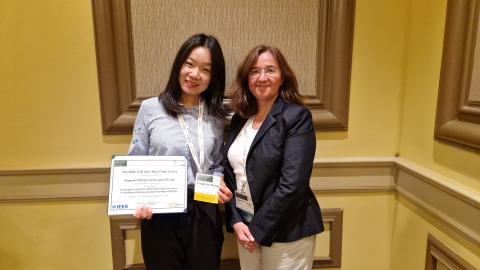Professor Douglas Blough and Ph.D. candidate Jingyuan Zhang's prizewinning paper unveils strategies using intelligent surfaces to revolutionize wireless network coverage.
Photo caption: Ph.D. candidate Jingyuan Zhang (left) receiving the award from Damla Turgut (University of Central Florida), a steering committee member of this year’s Conference on Local Computer Networks.
—
Professor Douglas Blough and Ph.D. candidate Jingyuan Zhang have received the Best Paper Award at this year’s IEEE Conference on Local Computer Networks (LCN).
Blough, who has been a part of the Georgia Tech School of Electrical and Computer Engineering (ECE) faculty since 1999, currently holds the position of associate chair for faculty development. Zhang contributes to groundbreaking research as a member of the Critical Networking Laboratory led by Blough. Their focus lies in developing and evaluating advanced networks and systems, incorporating the latest breakthroughs in physical-layer networking.
The prizewinning paper, titled "Enhancing Coverage in Intelligent-Surface-Assisted mmWave WLANs through Multi-Hop Communication Analysis," tackles a crucial issue in the upcoming era of wireless networks that harness the millimeter-wave (mmWave) spectrum—specifically, the challenge of mitigating signal blockage inherent in mmWave frequencies.
One promising technology that can be used for this purpose is the reconfigurable intelligent surface (RIS), which can flexibly relay signals around obstacles when placed at strategic locations in the environment. The paper quantifies the improvement in mmWave wireless coverage that results from the use of RISs in single-RIS and multi-RIS link configurations. The results shed light on the relationship among connection probability of communication links, link budget parameters, RIS distribution, and obstacle distribution. The findings can help guide future mmWave network deployments to minimize the impacts of blockages on network performance and provide seamless operation to users in next-generation networks.
The paper stood out among 105 submissions during the 48th IEEE LCN held in Daytona Beach, Fla., in October. The conference is renowned as the premier event addressing both theoretical and practical aspects of local computer networks.
